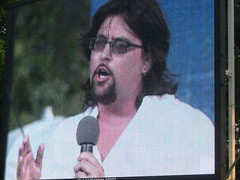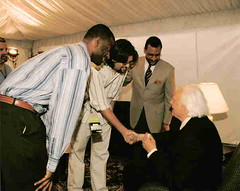In honor of MLK
Jordon links to a provocative article in England's Observer newspaper about the rebuilding of New Orleans. Some of its most salient passages relate to race and the economics of rebuilding, so it's an appropriate first post on Martin Luther King Day. His dream continues, unfinished. On the complications race brought to the evacuation:
Was it, therefore, simply a matter of white 'haves' abandoning black 'have-nots'? Not quite. In the decades since the civil-rights movement, America has enmeshed itself in a cocoon of self-delusion and double-talk where race is concerned, and many African-Americans, their own fortunes improving, have played along. The black middle-class has distanced itself from those left behind. Chris Rock, the black comedian, jokes that he loves black people - it's niggas he can't stand. For others, it isn't a joke. The people stranded at the Superdome and Convention Centre were pariahs, and the root of their exclusion, deeper even than race, is poverty. They are what's buried below. Everything that the American Dream is supposed to wipe away. They aren't supposed to exist, yet here they are. How, in God's name, to make them disappear?On who's to blame:
In recent decades, the mayors and the majority of the city council have been African-Americans, which merely proves that black rip-off artists can be as voracious as white. Pre-Katrina, tourism generated $1 million a day but not a dime ever seemed to reach the streets. And this was deliberate. Tourists need service - menial labour to clean their tables and make their beds, hose away their vomit on Bourbon Street. To provide it, the city adopted a policy of malign neglect. The old black neighbourhoods, rich in history and culture, were allowed to sink into ruin and the school system to founder. Without education, there was no way out. Many who refused to submit to grunt work in the Quarter became criminals, most often drug dealers. The public-housing projects that ringed the city's centre became armed camps, where killing was seen as proof of manhood. By 2000, New Orleans was America's murder capital, eight times as deadly as New York.On whose pockets the rebuilding will line:
Nagin, like most of the city's black mayors, is light-skinned; the majority of project dwellers are dark. In a city where the 'brown paper bag test' has held sway for 200 years as a guideline to social status, this is no petty distinction. The reshaping of New Orleans, he seems to feel, is not a matter for the mass of its people. Like most things in America, it will be determined by dollars, and dark-brown dollars aren't many.On the possibility that displaced poor people will be allowed a meaningful role in rebuilding:
A few citizens have set to work on gutting and restoring their houses, but the city has made no move to help. Nagin makes bold speeches, telling people to come on home. The trick is, they have no homes to come to. FEMA has thousands of trailers on hand, which could serve as temporary dwellings, but no black area has electricity, and white areas, which have, don't want trailer camps. As a result, most blacks who've returned are hunkered across the Mississippi in Algiers or out by the airport in Kenner.... Before Katrina, the city had need of young black males; in the new blueprint, they're surplus to requirements, especially if, like B, they come from the streets. Law-abiding or not, they find themselves demonised. In the days after the hurricane, the level of looter-hysteria reached such heights that two groups of white uptowners, not content with arming themselves, rented Israeli commando units for protection. The widely reported snipers at Charity Hospital turned out to be imaginary. And when the losses to looting were totted up, some of the worst culprits turned out to be policemen.Article.













0 Comments:
Post a Comment
<< Home